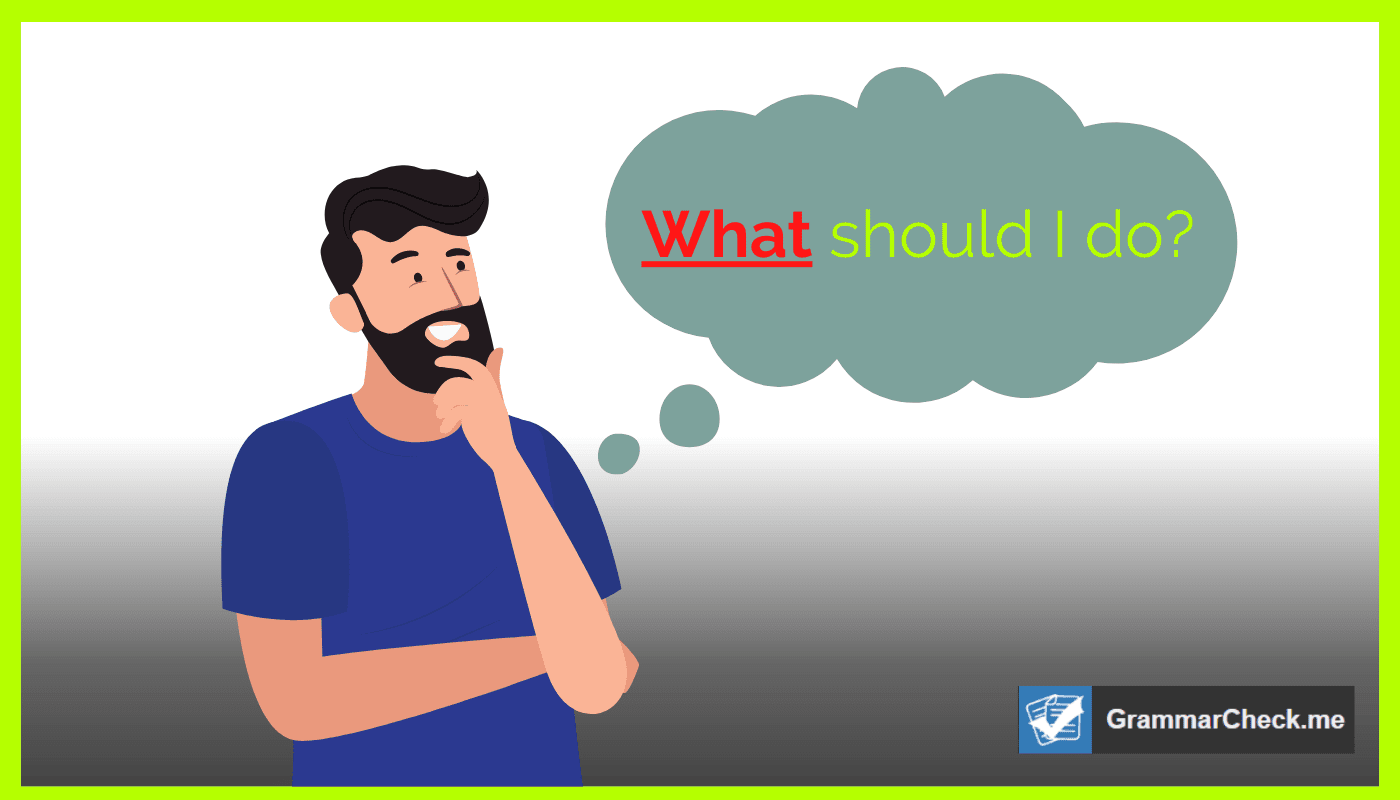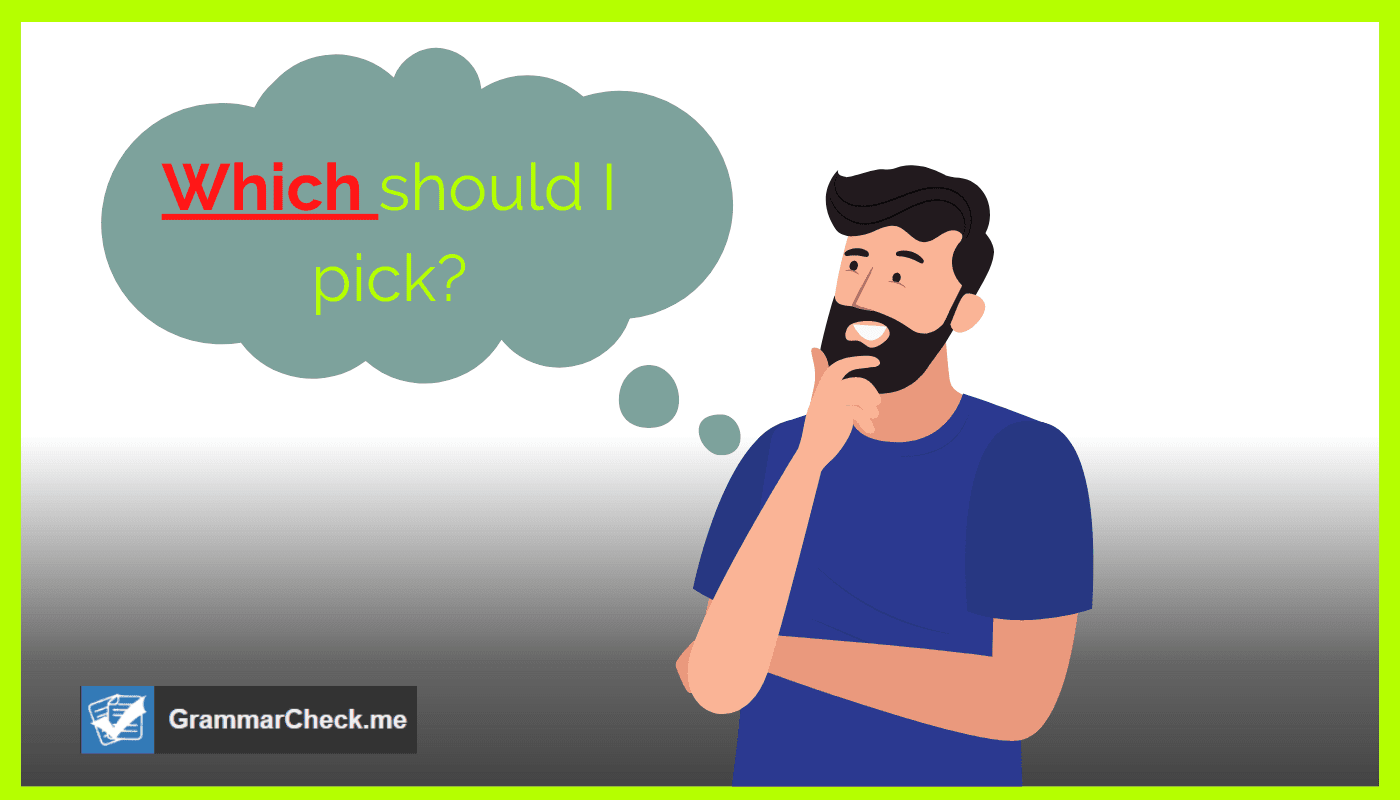Finally master what vs which grammar rules with help from this article!
There are many commonly confused words in the English language, making it even more challenging to learn than it already is for non-native speakers and students. Two words that are often confused – even by native English speakers – are “what” vs “which.” The question is, which word do you use and when?
Keep reading to learn the “what” vs “which” grammar rules to know which word to use in your sentences. As a bonus, you’ll also get clarification on other commonly confused words to improve your grammar and vocabulary.
The Meaning of “What”

First things first: what exactly does “what” mean?
While the word seems basic, and you regularly use it in your everyday speech, having a thorough understanding of the meaning will help you differentiate it from “which.”
Takeaway: “What” is one of the main wh– words, which include who, where, what, and when. “What” can be used as a pronoun, determiner, or adverb.
- When used as a pronoun, “what” is used to ask for information specifying something. An example is asking someone, “What is your name?”
- As a determiner, “what” can be used the same way, referring to the whole of an amount. Here’s an example: “We offered her what little we had.”
- As an adverb, “what” can be used similarly to the word “how” to ask a question. Here’s an example: “What’s it matter to you?” This is a more informal use of the word “what,” but still a common one.
You may see the similarity between the different uses of the word—the word “what” is used in all three instances to ask for information. Just like the words yet and but, you need to pay close attention to the context of the sentence to use them correctly.
The Meaning of “Which”

While it isn’t in the original list of wh– words, “which” also asks questions and introduces relative clauses.
A relative clause, also known as an adjective clause, connects ideas with pronouns relating to something previously mentioned so you can combine two independent clauses into one sentence.
Here’s an example of “which” in a sentence before a relative clause:
- Washington, D.C., which is the capital of the United States, is a city with many diplomats.
In the sentence above, the relative clause is “the capital of the United States,” and the word “which” introduces that.
“Which” is also used as a question word. Just like with the words in page vs on page, you have to pay close attention to the context of the sentence. Similar to the word “what,” which can be used as a determiner or interrogative pronoun to ask for specific information, as in the following example:
- Which one is your favorite?
- Which movie did you decide on yesterday?
- Which parent is picking you up today?
“Which” is also used for indirect questions and statements as well. Here’s an example:
- If you ask Jack which day they’re going to the beach, we’ll figure out if we can join.
Now that you understand both “what” and “which,” let’s figure out when to use each of these words.
“Which” vs “What” Grammar Rules
Both “which” and “what” are used to ask questions. There are instances where each word looks like it may work in a sentence, just like with the words axel vs axle. However, it’s only ever grammatically correct to use one of the words, and it’s important to figure out which one it is.
As a general rule, “which” is used when there is a limited range of answers to the question. “What” is used when there isn’t a limit on the range of answers to the question.
Take the following examples:
- Which country has more people, France or England?
- What are your favorite songs from this year?
In the first example, there are only two options to choose from, France and England, which makes it more appropriate to use “which” due to the restricted nature of the choices. If the sentence did give options and was instead more general, “what” would be more appropriate. For example, the sentence could become “What country has the most people?”
In the second example, there’s no limit to the songs to pick from, so “what” is the better grammatical choice in this sentence. For “which” to be the better choice in this sentence, we’d need to restrict the song choices. For example, the sentence can become “Which artist had the best song from this year, Taylor Swift or Drake?”
Other Commonly Confused Words
English has an abundance of commonly confused words. Here are a few others that you should know.
1) Than vs Then
“Than” vs “then” are two commonly confused words with different meanings. “Than” is a conjunction used to compare two things. This is very similar to the everyones or everyone’s grammar rules. “Then” is usually an adverb that indicates time.
Here are two examples:
- In my opinion, pizza is better than sushi.
- We had dinner, and then we went to a movie.
2) That vs Which
“That” and “which” are similar to “what” vs “which” grammar rules in the way they’re used.
“That” is used when the phrase or clause that follows it is necessary for the sentence. Meanwhile, “which” is used when the phrase or clause that follows it is unnecessary.
Here are two examples:
- Children that have tutors usually perform better in school.
- Christmas, which is my favorite time of year, is just around the corner.
3) Who vs Whom
Although “whom” is not often used in everyday writing and speech, it’s still important to know the difference between who and whom.
“Who” is a pronoun that is used as a sentence’s subject. “Whom” is a pronoun that is used as a direct object.
Here are two examples:
- Who is going to wash the dishes?
- To whom was the letter addressed?
Final Thoughts
“What” vs “which” grammar rules may seem confusing at first, but they become simpler to understand as you keep using each word. If you need help figuring out how to get commonly confused words right, Grammarly can help you point out your mistakes.
